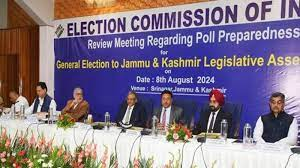
Table of Contents
J&K Security
In recent years, Jammu and Kashmir (J&K) has remained a focal point in Indian politics due to its unique geopolitical status and ongoing security concerns. The upcoming meeting between the Election Commission of India (ECI) and the Home Secretary, scheduled for tomorrow, underscores the importance of addressing security issues in this sensitive region as part of the broader electoral process. This meeting highlights the crucial intersection of security and electoral integrity, aiming to ensure a safe and fair election process in J&K.
Context and Background
Jammu and Kashmir, a region with a complex socio-political landscape, has been a central topic in Indian political discourse. The state’s special status was abrogated in August 2019, following the revocation of Article 370 and Article 35A of the Indian Constitution. This move was met with mixed reactions, leading to heightened security measures and a significant impact on the political and social climate of the region.
In the wake of these developments, ensuring a smooth and secure electoral process has become a paramount concern for the Indian government. The Election Commission of India, as the body responsible for overseeing elections, plays a critical role in coordinating with various stakeholders, including security agencies, to facilitate free and fair elections.
The Significance of the Meeting
The meeting between the Election Commission and the Home Secretary is set against the backdrop of ongoing security challenges in Jammu and Kashmir. The primary focus of this meeting is to discuss and plan for the security arrangements necessary for upcoming elections. Here are some key points of discussion likely to be on the agenda:
- Security Arrangements: Ensuring the safety of voters, polling personnel, and election materials is of utmost importance. The meeting will address how to deploy security forces effectively to prevent any disruptions or threats during the electoral process. This includes managing the presence of paramilitary forces, local police, and other security agencies.
- Logistical Challenges: Given the geographical and infrastructural challenges in Jammu and Kashmir, the meeting will also cover logistical aspects related to conducting elections in remote and sensitive areas. This includes transportation of ballot boxes, setting up polling booths, and maintaining communication lines.
- Coordination with Local Authorities: Effective coordination between the Election Commission and local administrative authorities is essential. The meeting will discuss strategies to ensure smooth collaboration and address any potential issues that may arise at the local level.
- Addressing Security Threats: The region has faced various security threats, including militant activities and cross-border tensions. The meeting will likely focus on assessing the current threat landscape and devising strategies to mitigate risks during the election period.
- Voter Safety and Confidence: Ensuring voter safety and confidence in the electoral process is crucial. The meeting will address measures to reassure the electorate and maintain the integrity of the voting process.
Recent Developments and Challenges
In recent years, Jammu and Kashmir has experienced fluctuating levels of violence and unrest. The revocation of special status in 2019 led to widespread lockdowns and communication blackouts, impacting the political environment. Despite the government’s efforts to improve security and stability, challenges persist.
For instance, there have been sporadic incidents of violence and unrest, which have raised concerns about the safety of conducting elections. The security forces have been engaged in counter-insurgency operations, and managing these operations while ensuring electoral security remains a complex task.
Moreover, the political landscape in Jammu and Kashmir has evolved, with new political dynamics and emerging local parties. The meeting will also address how these changes impact the electoral process and the role of security forces in maintaining a neutral and unbiased environment.
The Role of the Election Commission
The Election Commission of India is responsible for ensuring that elections are conducted in a free, fair, and transparent manner. In Jammu and Kashmir, this role is particularly challenging due to the region’s unique security environment.
The ECI’s responsibilities include:
- Overseeing the Electoral Roll: Ensuring that the electoral roll is accurate and up-to-date.
- Monitoring Campaigns: Monitoring political campaigns to ensure compliance with election laws and regulations.
- Facilitating Voting: Arranging for accessible and secure voting facilities for all eligible voters.
- Addressing Complaints: Handling complaints and grievances related to the electoral process.
Future Prospects
The outcomes of the meeting between the Election Commission and the Home Secretary will be closely watched by various stakeholders, including political parties, local residents, and international observers. The effectiveness of the security arrangements and the overall management of the electoral process will have significant implications for the future political landscape of Jammu and Kashmir.
Successful elections in Jammu and Kashmir could pave the way for increased political engagement and stability in the region. Conversely, any challenges or disruptions could further complicate the political situation and impact public trust in the electoral process.
Conclusion
The meeting between the Election Commission of India and the Home Secretary represents a critical step in addressing the security concerns associated with elections in Jammu and Kashmir. By focusing on comprehensive security arrangements, logistical challenges, and effective coordination, the goal is to ensure a safe and fair electoral process. As Jammu and Kashmir continues to navigate its complex political landscape, the outcomes of this meeting will play a pivotal role in shaping the future of electoral politics in the region.
This meeting underscores the importance of balancing security with democratic processes, highlighting the ongoing efforts to address the unique challenges faced by Jammu and Kashmir in its journey towards stability and political engagement.
J&K Security J&K Security J&K Security J&K Security







